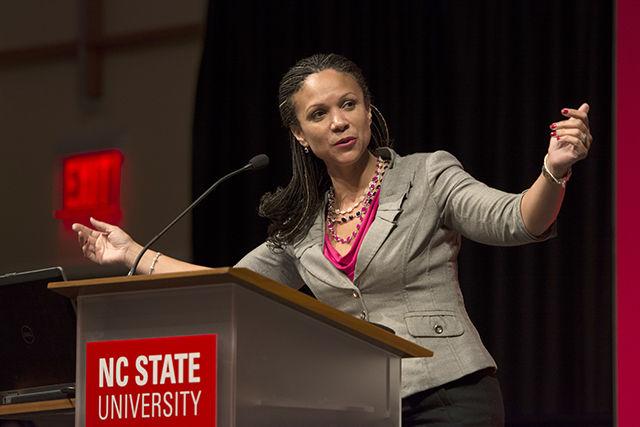Melissa Harris-Perry, MSNBC TV show host, award-winning author and professor at Wake Forest University, addressed the continuing consequences of structural racial inequality in the United States to a crowd of more than 600 people Monday night in the Talley Student Union Ballroom.
Harris-Perry was invited to speak at NC State by the African American Cultural Center for this year’s Martin Luther King Jr. Commemoration event.
“I want to begin with King,” said Harris-Perry. “Dr. Martin Luther King Jr. comes from a movement. A movement of bodies.”
Something important happens when people reflect on the bodies of the people who have inspired and supported the civil rights movement, Harris-Perry went on to say to the crowd.
“If we don’t remember the bodies, we won’t remember that there is a connection between King’s movement and what continues to happen today,” Harris-Perry said. “These are bodies that have not and will not be moved. Bodies that march, bodies that have been broken, and bodies that have broken boundaries.”
Harris-Perry referred to laws pertaining to the civil rights movement that would not have been enacted if black bodies did not break so they could be put into place, such as with John Lewis and the 1965 Voting Rights Act and Martin Luther King Jr. and the 1968 Fair Housing Act.
“Every single major piece of legislation had to be passed over broken and murdered bodies, and yet we somehow think it’s a discursive argument that needs to be made,” Harris-Perry said.
While these events are long in the past, the pattern still continues to this day. Harris-Perry said this decade has been particularly fraught for black people, citing events such as Hurricane Katrina in 2005 and the media’s impact in covering more recent racial conflicts around the country.
For young black men, 1.5 percent in 1 million are reported killed by police each year,” Harris-Perry said. “In 2012 we lost Trayvon Martin. In 2014, we lost John Crawford and Michael Brown. The death of white bodies are avenged by the state, while the death of black bodies doesn’t even lead to indictment.”
Harris-Perry noted that racial inequality stems far beyond the relationship between black people and the police, arguing that the stress of being black in the U.S. causes a less obvious harm to the people living in oppression.
“African-Americans have the highest death rates from heart disease and strokes,” Harris-Perry said.
“It’s also important to note that black women are more likely to die sooner, even if those women are educated, married, have health insurance, even if they have had prenatal care. There is research showing that low birth weight is also connected to experiences of racial stress and racial inequality in childhood,” Harris-Perry said. “We carry this oppression around in our bodies.”
Harris-Perry asked the audience where to go from here, and whether it’s more important to focus on the chaos or on the community.
“King encouraged black bodies and minds to get creative,” Harris-Perry said. “I think that the answer is art, because art creates a space for creative maladjustment. The artist accepts no arbitrary boundary. The artist refuses to be invisible. The artist refuses to be silent. The artist is unconcerned with authority but invested in community.”
Bianca Pearson, a sophomore studying history, said it’s important to continue commemorating King because of the legacy he left.
“He had a voice, and he had a goal to change this nation,” Pearson said. “He not only spoke of things and changes needed to be made, but he actually accomplished his goals.”
Harris-Perry received a standing ovation from the crowd after her speech.








